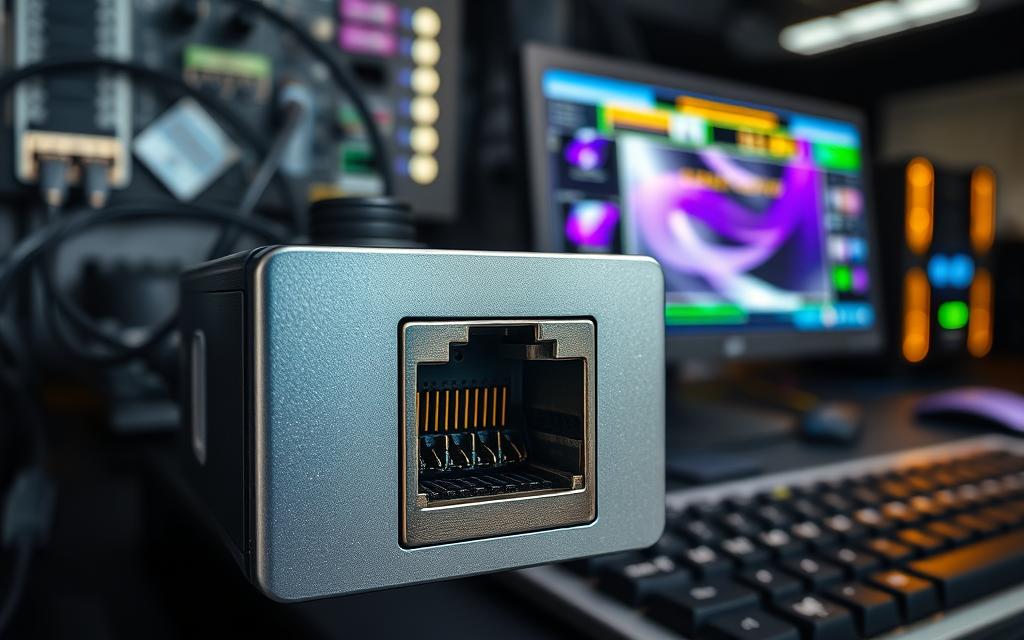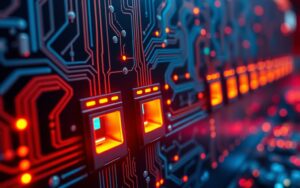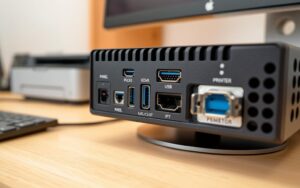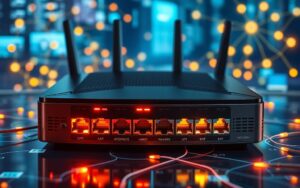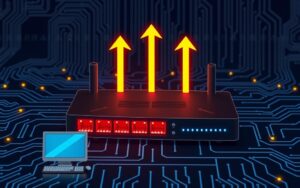Table of Contents
An Ethernet port can be found in many devices like gaming consoles, laptops, and routers. It lets devices connect to networks or the internet through a wired connection. This makes it faster and more reliable than wireless connections.
This article looks into what an Ethernet port is and why it’s important. It also explains how it works and how to fix issues with it. This will help users keep their internet connection strong.
Understanding Ethernet Ports
Ethernet ports are key in setting up sturdy network links. They help us grasp their value in LAN connectivities. By knowing what they are, how they look, and what gadgets they support, we can use them better.
Definition and Purpose
Ethernet port covers a few terms like Ethernet jack and connector. These ports are doors for Ethernet cables to link devices. They are vital for sending data over wired networks. This makes them crucial for network chats to happen smoothly.
Physical Characteristics
Ethernet ports stand out with their rectangular shape. They fit an 8P8C (RJ45) connector for a snug cable fit. They also have a latch for holding cables tight. Plus, they often have lights to show if they are on or if data is moving. This means we can spot them easily on all kinds of devices.
Common Devices Featuring Ethernet Ports
You can find Ethernet ports on many tools like game consoles and PCs to printers and internet boxes. They play a big role in tech, connecting devices fast and stably. Check out TrueCable for more. They show how vital Ethernet ports are for reliable, wired net access.
| Device Type | Usage | Common Ethernet Port Speed |
|---|---|---|
| Router | Network connectivity for multiple devices | 1 Gbps |
| Gaming Console | Online gaming and media streaming | 1 Gbps |
| Smart TV | Streaming services and internet browsing | 1 Gbps |
| Printer | Network printing capabilities | 100 Mbps |
| Modem | Connecting to internet service providers | 1 Gbps |
What Is Ethernet Port in Computer
The Ethernet port is key for efficient network connectivity in computers and devices. It provides wired Internet connections, connecting directly to routers and network hardware. Compared to wireless, these connections are more stable and fast.
Role in Network Connectivity
Ethernet ports are mainly found on the back of devices like desktops, laptops, and network tools. They enable devices to talk to each other within a network. This helps create networks like Local Area Networks (LANs).
Devices with Ethernet ports include:
- Routers
- Switches
- Modems
- Gaming consoles
- Smart TVs
- Digital video recorders
- Smart home hubs
Ethernet ports on motherboards have moved from external NIC cards to built-in options. This change makes connections easier while keeping performance high.
Types of Ethernet Connection
Today, there are various Ethernet connection types, each known for their speed. The common types are:
| Connection Type | Speed |
|---|---|
| Fast Ethernet | 10/100 Mbps |
| Gigabit Ethernet | 1 Gbps |
| 10 Gigabit Ethernet | 10 Gbps |
Different cables like Cat5e, Cat6, and Cat6A are used for these connections. Each cable type has features for various network needs. For the best results, it’s best to use factory-made and certified patch cords.
How Ethernet Ports Work
Ethernet ports depend on the Network Interface Controller (NIC) that’s part of the computer’s motherboard. This connection is key for handling wired communications. The NIC bridges the device and the network, with circuits managing data flow. Understanding how NIC works helps us solve connectivity problems and improve our network setups.
Connection to Network Interface Controller (NIC)
The Ethernet port works through the NIC, making data transfer smooth. When you hook up to an Ethernet port, the NIC changes computer data into a network-friendly format. This lets us set up wired connections, linking many devices together into a network.
Establishing Internet Connections
To get an Ethernet Internet link, you connect a computer to a router or switch. This setup makes sure data flows well between your modem and computer, making online tasks better. Routers come with several Ethernet ports for multiple connections. This reduces delays found in wireless setups, proving Ethernet’s strong and steady Internet performance.
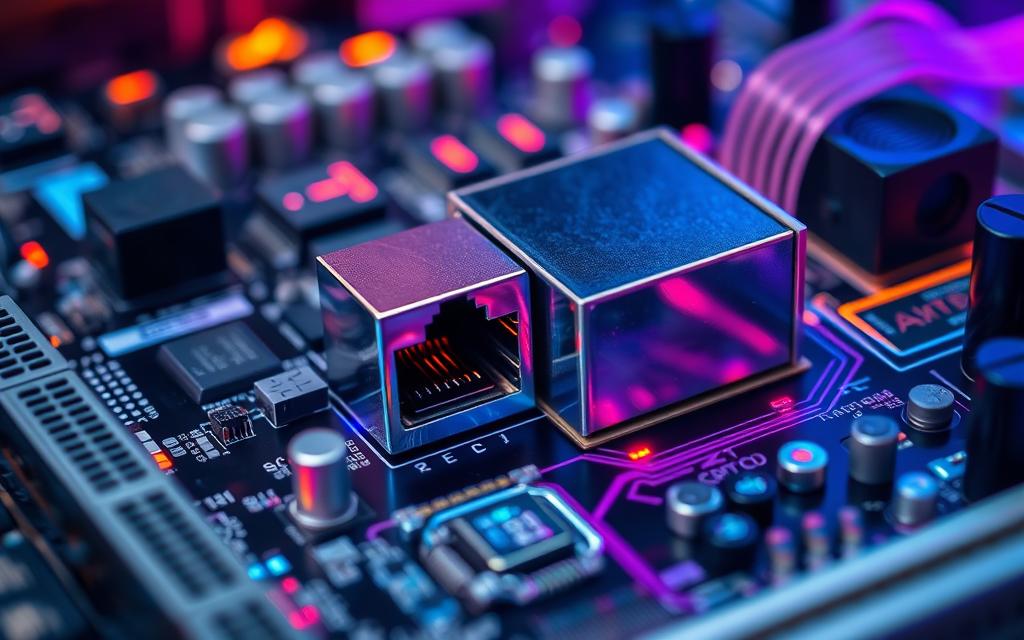
| Port Type | Maximum Speed | Common Usage |
|---|---|---|
| Fast Ethernet | 100 Mbps | Basic networking |
| Gigabit Ethernet | 1 Gbps | Most common in modern devices |
| 10 Gigabit Ethernet | 10 Gbps | High-performance networking setups |
| Multi-Gigabit Ethernet | 25 Gbps to 100 Gbps | Data centres and enterprise environments |
| Power over Ethernet (PoE) | Varies | IP cameras, VoIP phones |
As tech evolves, knowing how NICs and Ethernet ports interact is vital. It helps us boost performance and tackle issues in wired networks.
Connecting Devices Using Ethernet Ports
To set up a reliable Ethernet connection, you need to know about Ethernet cable types. You must also know how to connect devices correctly. Proper cables make sure your network works well and lets data move smoothly between devices.
Types of Ethernet Cables
Picking the right networking cables keeps your network performing well. You can choose from several types:
| Type | Max Speed | Max Distance | Common Use Cases |
|---|---|---|---|
| Cat5e | Up to 1 Gbps | 100 meters | Basic home networking |
| Cat6 | Up to 10 Gbps | 55 meters | Gaming and streaming |
| Cat6A | Up to 10 Gbps | 100 meters | High-performance environments |
When picking Ethernet cable types, think about what your setup needs. Cat6 and Cat6A are much faster than Cat5e, great for heavy use.
Step-by-Step Connection Process
Follow these simple Ethernet connection steps to connect your devices:
- Get the right patch cables for your devices.
- Make sure both devices have Ethernet ports empty.
- Connect the cable’s one end to the first device.
- Connect its other end to a switch or router.
- Check the connections and look for indicator lights as proof of connection.
For best results, use certified patch cords. If there’s a problem, first check your cable connections. Restarting modems or routers can fix some issues.
Proper use of connecting devices can boost your network’s performance. This is crucial for homes and offices. Learn more about Ethernet ports and their role in network systems here.
Conclusion
Ethernet ports play a key role in wired networking, helping devices communicate smoothly. They use an 8P8C (RJ45) connector for high-speed data exchange. This connection reduces delays and boosts reliability. The significance of Ethernet connections shines as they ensure stable Internet for devices, from PCs to smart gadgets.
Understanding Ethernet’s role in networking is essential. It concerns how they connect via Network Interface Controllers (NIC) and the choice between Cat5e and Cat6 cables. Also, learning to fix Ethernet issues improves your Internet use. For tips on sharing an Ethernet connection, check out this guide.
In our digital world, wired connections remain vital, standing strong alongside wireless. They offer more security and stability. Knowing about Ethernet ports and related tech helps make the most of them in homes and offices.
FAQ
What is an Ethernet port?
An Ethernet port is a spot where Ethernet cables are connected. It’s used in local, metropolitan, and wide area networks. This helps devices talk to each other.
What are the physical characteristics of an Ethernet port?
Ethernet ports look rectangular and have a latch for RJ45 connectors. They’re bigger than phone jacks. Often, there are LED lights to show activity and transfers.
How does an Ethernet port enhance Internet connectivity?
Ethernet ports make Internet connections faster and more stable than Wi-Fi. They cut down delays and improve reliability. This is because they allow direct connections to routers.
What types of Ethernet connections are available?
You can find various Ethernet speeds, from 10/100 Mbps to 1 Gbps and even 10 Gbps. Each type meets different needs, ensuring all users are catered to.
What is the role of the Network Interface Controller (NIC) related to Ethernet ports?
The NIC is key in processing data for wired networks. It’s on the computer’s motherboard. It links the computer to the network, handling data coming in and out.
How do I connect devices using Ethernet ports?
For connections, use high-quality patch cables. Plug one end into the device and the other into the router. Using the right cable ensures a strong network.
What are the different types of Ethernet cables?
Ethernet cables come in types like Cat5e, Cat6, and Cat8. Each type is made for specific network needs. They have different levels of shielding and frequency capabilities.
Where can I find Ethernet ports?
Ethernet ports are on many devices like desktops and laptops. They’re also on routers and smart TVs. This shows they’re crucial for connecting different devices.


